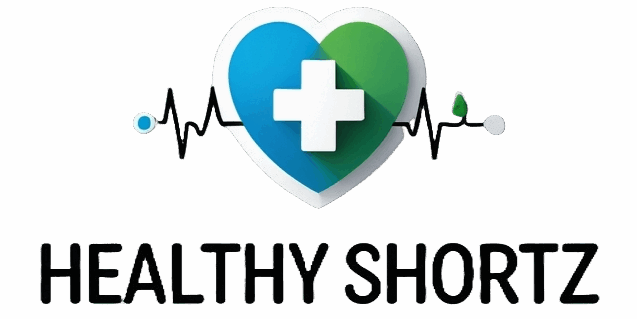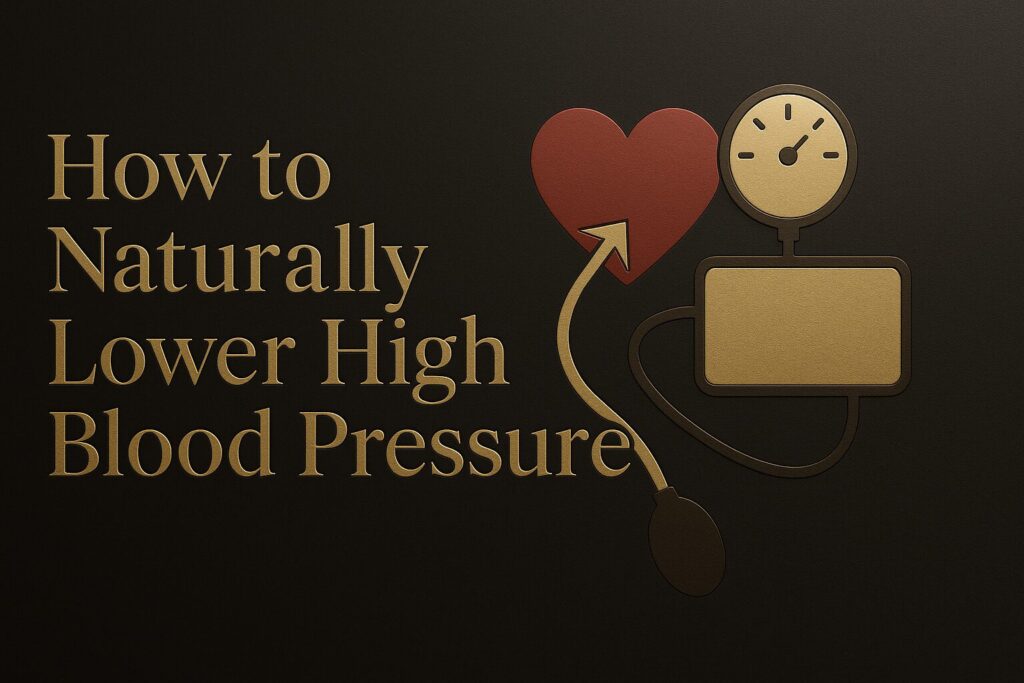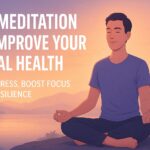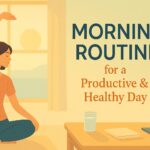Naturally lower high blood pressure with simple lifestyle changes, healthy foods, stress relief, better sleep, and home monitoring tips. Backed by science.
Table of Contents
Understanding High Blood Pressure: Causes and Risks
High blood pressure, also known as hypertension, is often called the “silent killer” and for good reason. It doesn’t always come with noticeable symptoms, but it can quietly cause serious damage to your body over time. When your blood pressure is consistently too high, it puts extra strain on your heart and blood vessels, increasing the risk of heart disease, stroke, kidney problems, and even vision loss.
So, what causes high blood pressure? There’s no single answer, but it’s often linked to a combination of lifestyle choices and genetic factors. Eating too much salt, not getting enough physical activity, being overweight, smoking, and drinking too much alcohol can all raise your blood pressure. Stress, lack of sleep, and certain underlying health conditions like diabetes or thyroid disorders can also contribute.
Age plays a role too. As we get older, our blood vessels naturally become less flexible, which can cause blood pressure to rise. And if high blood pressure runs in your family, you might be more likely to develop it as well.
The scary part? You might not feel any different until it’s too late. That’s why it’s so important to monitor your blood pressure regularly, especially if you’re over 40 or have a family history of hypertension.
The good news is that with the right changes, you can manage and even lower your blood pressure naturally. In the following sections, we’ll explore effective, science-backed ways to improve your heart health and feel better overall. No harsh medications, just simple daily changes that can make a big difference over time.
The Power of Diet: Foods That Help Reduce Blood Pressure
What you eat plays a major role in how your body manages blood pressure. In fact, your diet can either be your biggest risk factor or your most powerful tool when it comes to heart health.
One of the most proven approaches is the DASH diet (Dietary Approaches to Stop Hypertension). It’s not a fad diet or strict meal plan it’s simply a balanced way of eating that focuses on whole, nutrient-rich foods. Think of colorful fruits and vegetables, whole grains, lean proteins (like fish and beans), and low-fat dairy. These foods are naturally rich in potassium, magnesium, and fiber, which all help regulate blood pressure.
On the flip side, cutting back on sodium (salt) is a game-changer. Many processed and packaged foods even seemingly healthy ones are loaded with hidden salt. Swapping out canned soups, chips, fast food, and frozen meals for home-cooked dishes can drastically lower your sodium intake.
Don’t forget the power of specific foods too. Bananas, spinach, avocados, sweet potatoes, and beets are especially high in potassium, which helps counteract the effects of sodium in your system. Oats and flaxseeds are full of fiber and omega-3s, which support healthy arteries. And sipping on hibiscus tea has even been shown to lower blood pressure in some studies.
You don’t have to change your entire diet overnight. Start small. Maybe add a fruit to your breakfast or swap salty snacks for raw nuts. Over time, these simple choices can help your blood pressure come down naturally and deliciously.
Hydration and Heart Health: How Water Affects Blood Pressure
We often hear that staying hydrated is important for our overall health, but did you know it can also impact your blood pressure? It’s true something as simple as drinking enough water each day can help your heart function better and your blood pressure stay in check.
Here’s how it works: when you’re dehydrated, your body tries to compensate by retaining sodium. This increases the volume and pressure inside your blood vessels, making your heart work harder to pump blood. Over time, that extra strain can contribute to high blood pressure. Dehydration can also cause your blood vessels to constrict, which further elevates your pressure levels.
On the other hand, when you’re well-hydrated, your blood flows more freely, your kidneys function more efficiently, and your blood pressure tends to stay more stable. It’s one of the simplest lifestyle tweaks you can make, yet it’s often overlooked.
So, how much water should you drink? A good rule of thumb is around 8–10 glasses (about 2–2.5 liters) per day, but this can vary depending on your size, activity level, and the climate you live in. You don’t need to obsess over the exact number just aim to sip consistently throughout the day. If your urine is light yellow, you’re probably in a good range.
If plain water isn’t your favorite, you can also hydrate with herbal teas, fruit-infused water, or water-rich foods like cucumbers, melons, and oranges.
Small changes can lead to big results. Simply making hydration a priority is a gentle but powerful way to support your cardiovascular health and naturally lower your blood pressure.
Exercise Naturally Lowers Blood Pressure – Here’s How
When it comes to managing high blood pressure naturally, regular physical activity is one of the most effective tools you have. You don’t need a gym membership or a hardcore fitness plan just moving your body more often can make a big difference.
Exercise helps your heart become stronger. A stronger heart can pump blood more efficiently, putting less pressure on your arteries. It also helps your body use oxygen more effectively, reduces stress hormones, and improves blood vessel function all of which are beneficial for keeping your blood pressure in a healthy range.
So, what kind of exercise is best? Aerobic activities like walking, cycling, swimming, or dancing are great choices. Aim for at least 30 minutes of moderate activity, five days a week. If you’re just starting out, even a 15-minute brisk walk once or twice a day is a great beginning. The key is consistency.
If you enjoy variety, mix in yoga or light strength training. Yoga, in particular, combines movement with breathing and stress relief, which offers double benefits for blood pressure control.
Don’t worry if you’re not an athlete. You don’t need intense workouts just keep moving. Walk your dog, take the stairs, stretch during TV breaks, or try a beginner dance video at home. Every little bit adds up.
The best part? Exercise doesn’t just help lower blood pressure it also boosts mood, energy, sleep, and confidence. And as you build the habit, you’ll likely notice that your body feels stronger and more balanced too.
Stress Management Techniques That Actually Work
Stress is a natural part of life, but when it builds up or lingers too long, it can silently take a toll on your body especially your blood pressure. When you’re stressed, your body releases hormones like adrenaline and cortisol, which cause your heart to beat faster and your blood vessels to narrow. Over time, chronic stress can keep your blood pressure elevated and increase your risk of heart problems.
But here’s the good news: you don’t have to live in “stress mode.” There are simple, practical ways to manage stress naturally and even enjoy the process.
Deep breathing is one of the quickest tools. Try inhaling slowly for 4 seconds, holding for 4 seconds, and exhaling for 6. Do this for just a few minutes and you’ll feel your heart rate slow and your mind clear. It’s a small shift with a big impact.
Meditation and mindfulness are also powerful. You don’t need to sit cross-legged in silence for an hour just 5–10 minutes of quiet focus on your breath or a calming sound can reset your nervous system. Apps like Headspace or Insight Timer can help you get started.
Spending time in nature, even a short walk outside, is incredibly grounding. So is journaling write down what’s on your mind without judgment. Letting your thoughts flow can lighten your mental load.
And don’t forget the joy factor. Doing things you love whether that’s listening to music, gardening, crafting, or talking to a friend brings calm to your system. It’s not selfish; it’s self-care.
Managing stress is about progress, not perfection. Make space for peace in your daily life, and your heart and blood pressure will thank you for it.
Quality Sleep and Its Impact on Blood Pressure
We often treat sleep like a luxury something we squeeze in after everything else is done. But the truth is, good-quality sleep is essential for heart health, and it plays a direct role in regulating your blood pressure.
When you sleep, your body goes into a state of repair. Your heart rate slows down, your blood vessels relax, and your body resets its stress hormone levels. This restful state is when your blood pressure naturally dips, giving your cardiovascular system a much-needed break. But if you’re not getting enough sleep or your sleep is constantly disrupted your blood pressure can remain elevated, even while you rest.
Studies show that getting less than 6 hours of sleep per night is linked to a higher risk of hypertension. And if you’re dealing with conditions like sleep apnea or frequent waking, the impact can be even more significant.
So how can you improve your sleep naturally?
Start by creating a bedtime routine. Try going to bed and waking up at the same time every day, even on weekends. Avoid screens (phones, laptops, TVs) at least 30–60 minutes before bed, as the blue light can interfere with your body’s natural melatonin production.
Make your bedroom a sleep-friendly zone cool, dark, and quiet. If your mind tends to race at night, try calming techniques like gentle stretches, meditation, or writing in a journal before bed.
Also, be mindful of caffeine and alcohol. Both can interfere with deep sleep, especially if consumed late in the day.
Remember: your body does its healing work while you sleep. Prioritizing rest isn’t lazy it’s a smart, natural step toward lowering your blood pressure and feeling your best.
Limit These Habits: Alcohol, Caffeine, and Smoking
Some daily habits might seem harmless even enjoyable but they can quietly push your blood pressure in the wrong direction. If you’re trying to naturally lower high blood pressure, it’s important to take a closer look at how alcohol, caffeine, and smoking affect your heart.
Let’s start with alcohol. While a glass of wine here and there may not be harmful, excessive or frequent drinking can raise your blood pressure over time. Alcohol interferes with the balance of calcium, magnesium, and potassium in your body all important for heart health. If you drink, try to stick with moderation: that means no more than one drink per day for women and two for men.
Now, what about caffeine? If you love your morning coffee, don’t worry moderate caffeine intake isn’t necessarily dangerous. However, in some people, caffeine can cause a temporary spike in blood pressure, especially if consumed in large amounts or if you’re sensitive to it. If you’re noticing jitteriness, rapid heartbeat, or higher readings after your coffee or energy drinks, it might be worth cutting back or switching to decaf or herbal alternatives.
Lastly, smoking is one of the most damaging habits when it comes to blood pressure. Every puff of a cigarette narrows your blood vessels, temporarily raises your blood pressure, and damages your arteries over time. The good news? Your body begins to heal within hours of quitting. There are plenty of support tools, patches, and programs out there if you’re ready to quit and it’s one of the most powerful gifts you can give your heart.
Changing habits can be hard, but start small. Even a single improvement today can make your heart healthier tomorrow.
Herbal Remedies and Natural Supplements
If you’re looking for ways to lower high blood pressure naturally, you might be curious about herbal remedies and supplements. While lifestyle changes like diet and exercise are the foundation, some natural options can give your efforts a helpful boost especially when used alongside a healthy routine.
Let’s start with garlic. This kitchen staple isn’t just for flavor it has compounds like allicin, which may help relax blood vessels and improve blood flow. Studies show that taking garlic supplements can modestly lower blood pressure, especially in people with hypertension.
Another powerful option is hibiscus tea. This bright, tangy tea is rich in antioxidants and has been shown in multiple studies to help reduce systolic blood pressure when consumed regularly. It’s also caffeine-free, making it a great alternative to black tea or coffee.
Omega-3 fatty acids, commonly found in fish oil or flaxseed oil supplements, are known for their heart-protective benefits. They help reduce inflammation and support smoother blood circulation both helpful for maintaining healthy pressure levels.
Magnesium is another nutrient that supports relaxed blood vessels and a steady heartbeat. Many people are unknowingly low in it, especially if they eat a lot of processed foods. A supplement or magnesium-rich foods (like leafy greens and nuts) can be beneficial.
Then there’s CoQ10, a natural antioxidant found in your body that supports energy production in cells including those in your heart. Some research suggests that CoQ10 supplements may help lower blood pressure modestly.
That said, natural doesn’t always mean risk-free. Always talk to your doctor before starting any supplement, especially if you’re on blood pressure medication. Some herbs can interact with drugs or affect how your body processes them.
Used wisely, herbal remedies can be a gentle, supportive part of your natural blood pressure toolkit.
Monitor Your Blood Pressure at Home
One of the most empowering things you can do to manage high blood pressure is to track it yourself at home. It might sound a little clinical at first, but monitoring your numbers regularly gives you real-time insight into how your body is responding to your lifestyle and helps you catch potential problems early.
Home blood pressure monitors are affordable, easy to use, and widely available. The key is choosing a validated, automatic upper-arm monitor for the most accurate results. Wrist monitors can work too, but they’re often less reliable if not positioned correctly.
To get the best reading:
- Sit in a quiet room.
- Rest for at least 5 minutes beforehand.
- Keep your feet flat on the floor and your back supported.
- Place your arm on a flat surface at heart level.
- Avoid caffeine, smoking, or exercise for at least 30 minutes before testing.
It’s a good idea to measure your blood pressure at the same time each day, such as in the morning and evening, and record your readings in a notebook or a blood pressure tracking app. This creates a pattern your doctor can review, instead of just a single number taken during a checkup (which might be affected by stress or nerves).
Regular monitoring can help you recognize what helps or hurts like how a good night’s sleep or a salty meal impacts your levels. It also gives you the confidence to take charge of your health and know when it’s time to check in with your doctor.
Remember: knowledge is power. A few minutes a day with your monitor can lead to months even years of better heart health.
When to Seek Professional Medical Help
While natural remedies and lifestyle changes can go a long way in managing high blood pressure, it’s important to remember that professional medical guidance is essential and sometimes urgent.
If your readings are consistently above 140/90 mmHg, or if you notice sudden spikes in your numbers, it’s time to talk to your doctor. High blood pressure can quietly damage your organs over time, including your heart, brain, kidneys, and eyes even if you feel fine. That’s why it’s often called a “silent killer.”
Also, watch for warning signs like:
- Frequent headaches
- Dizziness or blurred vision
- Chest pain or shortness of breath
- Nosebleeds not caused by injury
- Fatigue or confusion
These may indicate that your blood pressure is too high and needs immediate medical attention.
Even if you’re not experiencing symptoms, regular checkups are key. Your doctor can help you understand your risk factors, rule out underlying causes, and decide whether medication is needed. For some people, natural methods work beautifully on their own. For others, a combination of lifestyle changes and medication is the safest approach and there’s absolutely no shame in that.
Remember, your health journey is unique. Seeing a doctor doesn’t mean you’ve failed; it means you’re taking proactive, smart steps to protect your long-term well-being.
So while healthy habits, herbs, hydration, and movement are your daily tools your doctor is your trusted partner on the journey. Don’t hesitate to reach out when something feels off or you simply want to stay ahead.



